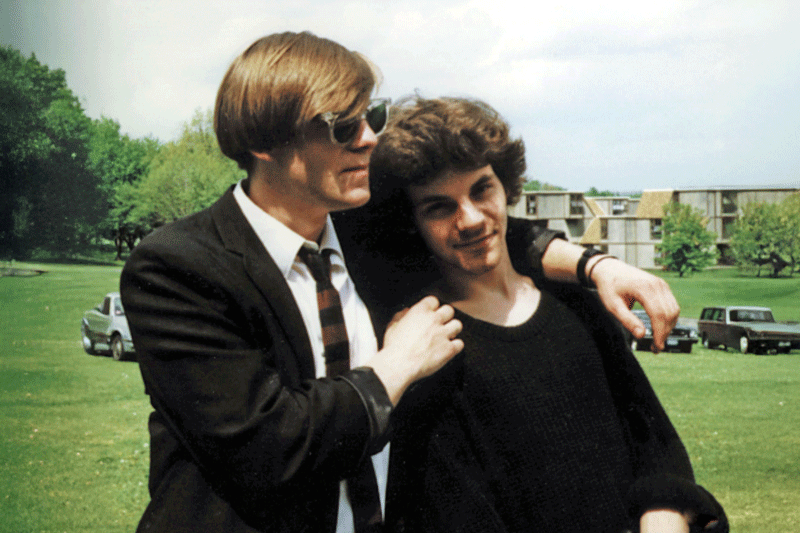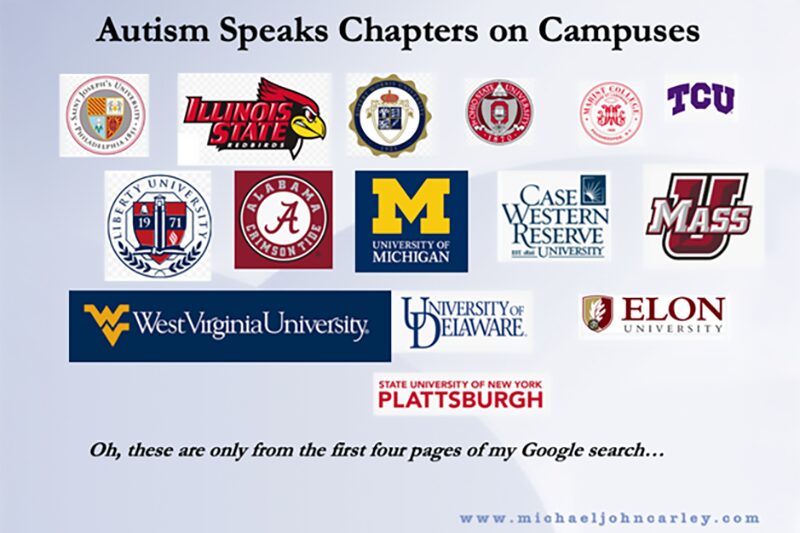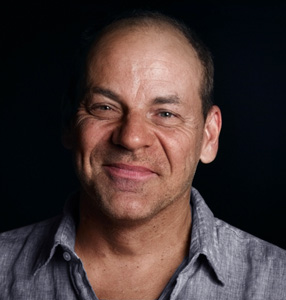NOTE: This article is an adaptation of a lecture given at Northeastern University on August 9, 2024. For the full, hour-long video of the presentation, please click here. A shorter version was co-hosted by Vanderbilt University and UCONN on December 13.
When I was researching my last book (The Book of Happy, Positive, and Confident Sex for Adults on the Autism Spectrum…and Beyond!), one of the biggest discoveries lay in the power of “painful conversations.” Painful conversations, I discovered, save relationships, and they keep us out of relationships we should not be in. But 99% of the time, we avoid them because…they’re painful. And so, often, nothing changes in the relationship. We don’t progress.

The author, Michael John Carley, as a Hampshire College undergrad with the artist (and college-best bud), Johan Westenburg.
Respectful study after study tells us that neurodivergent university students face major obstacles in their search for a happy, healthy college experience—and one that also leads to solid preparation for that outside world. Whether it’s executive functioning challenges towards homework, a high dropout rate partially due to an inadequate social life, a lack of self-advocacy skills, or yes—even conscious bias…we spectrumfolk face proportionately greater obstacles herein than our neurotypical peers.
But while neurodiversity higher education professionals are more than comfortable challenging conscious bias? The unconscious stuff, not so much. That’s par for the course with most of us, perhaps. But universities, the supposed pinnacles of wisdom, can be surprisingly ignorant, if not proudly ableist.
***
To start, how could higher education professionals possibly have biases towards neurodiversity? Not only are colleges supposed to represent the height of learning, but the majority of college specialists herein are actually VERY progressive in other areas. Not a lot of disability accommodations pros are “Trumpers.” Compared to other professions, college professors and research professionals are rarely racist or transphobic, and a higher percentage are themselves LGBTQ. But when it comes to neurodiversity—if not all of disability—an examination of their actions reveals a shocking tolerance of and comfort with organizations who demonstrate a firm belief that our neurodiverse lives are not worth as much as yours.
Let’s start with a brutally obvious example (I know, I know…)—chapters of the much-maligned autism research organization, Autism Speaks, that exist on college campuses.

For those not “in the know” about this organization, they offended people with autism to degrees unseen by any other organization. But unlike their fellow bigoted autism organizations (and there were a LOT), Autism Speaks was different because they were an absolute machine in recruiting celebrities and churning out successful fundraisers and publicity. This 2009 video they made is a great starting point to show their attitudes towards our value (but feel free to email me for hours of aghast reading). But because university professionals were star-struck into wanting to go to their parties or be allowed into the “exciting world” of genetic autism research, on-campus Autism Speaks chapters stayed put.
And for those who are fully aware of this history, you may, depending on which side you’re on, either cheer me on or scoff. Scoffers will think: “Michael John, again with the Autism Speaks criticisms…blah blah blah.” Admittedly, Autism Speaks is a really easy target for people on my ideological side of the fence.
But if they’re such an easy target, why are they still allowed to exist (with or without “re-branding”)?
This article is not written to critique Autism Speaks. It’s written to critique higher education professionals who are ok that Autism Speaks exists.
There’s a blatant parallel that if any of us joined an organization that stated that (let’s say…) people of African descent were incapable of the same potential as whites…I think it would be justified that we’d lose every black friend we have. And if an organization represented that same view, then that organization wouldn’t just have been eliminated. They’d have been sued for hate crimes, and their employees and grant recipients were blacklisted from ever working in the field again. But the world can’t make that mental connection that autism might deserve the same human value. Why?
***
Think of the autistic college student who arrives on campus. Already, they, like their neurotypical peers, are impacted by partisan politics, COVID, remote learning, George Floyd, and maybe even “woke pressure.” You’re more challenged than most—You’re autistic, after all. But you’re also an autistic who was capable enough to become a college student, so you’re not likely to be ignorant of the ugly history that defines the history of autism in this country—the fights over “cure,” vaccines, or the lie and hurtful rhetoric of genetic autism research. Well, maybe your school doesn’t have an Autism Speaks chapter. But even if they did, you might be so sick of the politics and ignore it, uninterested because you just want a job and a boyfriend, so lonely that you are susceptible to the niceness of the pretty girl who belongs to that Autism Speaks chapter…but you didn’t escape the message. And probably you’re too socially anxious to mention it to people because, like many autistics, you’re terrified of confrontation, or you don’t want to lose the relationship because of the aforementioned loneliness. All of this will contribute to low self-esteem.
That’s the blatant example. Thankfully, university Autism Speaks chapters are now almost extinct. Less blatant but still very harmful and numerous are collegiate “social skills” programs, deficit-based words and attitudes (if not outright ableist thinking), and well-meaning but colonialist individuals in charge of our care. Colleges and universities still believe that “Your way of doing things is bad. Our way of doing this is ‘appropriate.’” This requires overall campus culture change, not just a tweak in personnel.
***
Sometimes, it’s not even a neurodiversity program that contributes to low self-esteem. Is that autism research program on your campus? There was once a time when universities hysterically felt they weren’t complete without an autism research department. (I’m going to be very flippant here…) So they assembled clinical nobodies, promoted them as “leaders in the field” (but didn’t pay them that way), and most of these departments were dissembled or morphed into something else very quickly because the people they hired weren’t talented enough to get grants.
Even the newest Neurodiversity programs are often shamanist obligations. Near where I live, one respected New England college has posted an open position for the Executive Director of a new such center. However, the search firm’s position profile demands unreasonable excellence compared to the salary offered and, therefore, gives false optics toward whoever will be the inevitably disappointing hire. This job posting, like most, is also written in what I like to call “corporatespeak,” which, to a literal-minded person (such as many autistics like myself), is a language best described as “how to lie and get away with it.” Read for yourself…
“This center…is poised to become a national leader in neurodiversity, driving XXX College’s mission to create an inclusive, supportive, and dynamic learning environment for all students. XXX College has a long-standing history and reputation as a leader in supporting neurodivergent learners…XXX’s strong reputation for supporting students with learning differences…the College’s position as a leader in supporting neurodivergent learners.”
It’s a school with 2,000 students that has NO such “reputation” or “long-standing history in the field.” It doesn’t even mention a single disability on its DEI Initiatives page. I’m sure there are good, smart people working there. But leaders? Barf. This is just one microcosm of universities having fallen into a dependency on imagery and not transparency, which often renders the imagery fraudulent. Universities, often the powerful ones, sometimes choose to treat themselves as corporations, wherein executives call themselves “thought leaders” on their LinkedIn profiles (the Ivies, for instance, have notoriously humdrum neurodiversity programs and disability culture).
There are other examples of the unconscious harm that colleges enact on their spectrum students’ self-esteem. Drexel University publicly embraced the Medical Model of Disability; Rutger University’s autism support program exists in a multi-million dollar ABA program (ABA for college students???)…However, no one says anything despite the rarely noticed yet inarguable damage these programs subliminally do to their campus cultures. These situations are not the discussion topics on College Autism Network chats or AHEAD postings. And herein, we’re running away from our obligations to our communities.
As I’ve written about before, colleges have subliminal obstacles to inclusion for all their disabled students because of the way their disability accommodations departments are designed. I work for one, too. I get it. Our very system is there to treat the disabled student as a problem to be solved rather than a unique perspective to be shared and added to the broadly diverse university culture. Why should we need to obtain permission (i.e., accommodations) for what we need to learn? Extra time on tests? The ability to record lectures? Should we apply for accommodations allowing us to eat or go to the bathroom, too?
As many ASN readers saw play out in these pages, there was a 2022 article on college autism programs in the Chronicle of Higher Education that offended every autistic higher education pro in my circles, not to mention all of my students who read it. I wrote a response article using my column herein, stating that more autistics needed to be running higher education autism programs. No-brainer, right? Well, while it galvanized most, it received surprising resentment from powerful folks in the college autism program community. One individual with tremendous influence—well known to all—wrote me a stunningly dismissive email, talking down to me for criticizing Autism Speaks-influenced higher education professionals. “How dare I?” was the message because of “all the good work those people had done.”
In the context of “explanation and not justification,” I at least see that I am asking this person to have painful conversations with all their colonialist friends and that this might be a big ask of me to demand of this person. People have real relationships with these “villains” I critique. But what this person does not have, yet I do, is faith that their relationship will survive a painful conversation. I am still friends with Autism Speaks’ first-ever President, Mark Roithmayr. Why? We didn’t lie to each other, we had painful conversations, and we survived.
***
But even if we stopped the bigotry overnight, we cannot and will not move the needle on inclusion without the painful conversations about acknowledging past harm. Yet, no one practices restorative justice. We sweep the past transgressions under the rug, “don’t apologize,” “keep it ‘nice'” That’s the policy everywhere (and brudder, have I written a million times on the difference between “nice” and “good,” especially when “nice” is utilized to hide the fact that the person is anything but “good”). If people will not have these painful conversations yet are as nice as they come, then not only will they never further their cause, but they are categorically part of the problem and must be recognized as so.
Because what it comes down to is indeed that many of your categorical beliefs—Yes, even if you work in a college neurodiversity program—are that our lives are worth less. Not only do you not value our opinions of what you say about us…Do you all value us as human beings? Because when we see you hanging out and being friends with people who clearly don’t see us that way, you’re no ally. We may not confront you about this because, again, we’re terrified of confrontation, but we see it.
***
I’m lucky. I came from an upbringing (however risky) that taught me that no job is worth your soul. Later, I had higher education experiences that filled me with confidence and a work life that demanded a sense of ethics and a knowledge of restorative justice. These aren’t just vague, whimsical ideas about being nice. They’re core aspects of life that so few in the autism world seem to care about. They’re complicated and, like real diversity, they’re hard.
But I know something most of you don’t: When you do the right, humanist thing, you may get punished a little, and maybe you even lose a job. But you get rewarded much more (and you really can get another job). I know that what I say may seem like I am trying to sell you on a color no one’s ever seen. You’ll have to trust big time. My negative consequences for this presentation at Northeastern? A nervous boss (if she saw it), and people I don’t like, not liking me.
My positive consequences included an outpouring of respect and yet another post to add to my resume. In a new role (that replaces none of my others), I am now teaching a neurodiversity class at Northeastern’s new Neurodiversity Initiative—yes, the same school that hosted my lecture.
Do the right thing. Please?
***
As a youngster who’d lost his father in Vietnam, I was fascinated by the South African Truth Commissions. Don’t know about them? Look them up. After the fall of Apartheid, if you:
- had once been a (white) policeman, and you
- knew where the hidden bodies of blacks were, blacks that you or your colleagues had killed, and you
- testified in a public forum about where they were so that the families could achieve some closure via retrieval of the remains followed by proper burial and mourning
Then, you received full immunity from prosecution. No jail time. Lie about any detail under oath, and they throw the book at you, but…try to sit with that. What power! And also sit with how impossible it might feel to accomplish this here in the US.
But how hard would the following feel to say to colleagues who, let’s say, use deficit-based language in their roles as college neurodiversity program professionals?
“I appreciate how polite you’re trying to keep this conversation. But because I care about you, I can’t let you ignore that somewhere inside them, our students are really hurt by your deficit-based words and thinking. It’s not ok. I know you, and you’re better than this.”
How hard would it be for a university President to say the following?
“XXX University extends its heartfelt regrets and sadness to our autism community for once having hosted an active chapter of Autism Speaks. We want all of our community to know how aware we are of the damage that we might have done to the self-esteem—however subliminal—of our community’s autistic administrators, staff, faculty, students, and their allies. We apologize with everything we have and will work with you all to achieve whatever restorative healing is necessary for full reconciliation.”
And how hard would the following be for Autism Speaks?…
“We are so sorry. In our messaging and in our work, we did so much harm to the emotional health of families that trusted us, harm to the iconography of the very word “autism,” and especially harm to individuals with autism. We honestly didn’t know any better. In the early 2000s, when our founders initially consulted researchers, scientists promised us that a cure would be possible if we secured them with tens of millions of dollars. But 8-10 years later, when the promise of researchers was unraveling, and that maybe even we had been lied to…we arrogantly responded with denial. We made the decision not to apologize, we continued to spread lies about failed marriages, the potential of genetic research, the value of autistic lives…and we pretended not to hear their protesting voices, even though we knew they were right. Our very name is triggering trauma for so many, and therefore, we are finally folding. We will donate our resources and all remaining assets to humanist autism organizations and hope that somewhere in time, the world can forgive us.”
Michael John Carley is the Facilitator of the “Connections” program at New York University for their worldwide autistic students, and he also has a private, Peer Mentoring practice. In the past, he was the Founder of GRASP, a school consultant, and the author of “Asperger’s From the Inside-Out” (Penguin/Perigee 2008), “Unemployed on the Autism Spectrum,” (Jessica Kingsley Publishers 2016), “The Book of Happy, Positive, and Confident Sex for Adults on the Autism Spectrum…and Beyond!,” (Neurodiversity Press 2021, where he recently became the Editor-in-Chief), and dozens of published articles. His many other current posts include being the Neurodiversity and Leadership Advisor for the League School for Autism, and he is Core Faculty for both Northeastern University’s School of Engineering, and Stony Brook University’s LEND program. For more information on Michael John or to subscribe to his free newsletter, you can go to www.michaeljohncarley.com.




